*If you are new here, WELCOME! For Americanah, I provide your book club with a brief summary, a recipe, and discussion questions in that order!
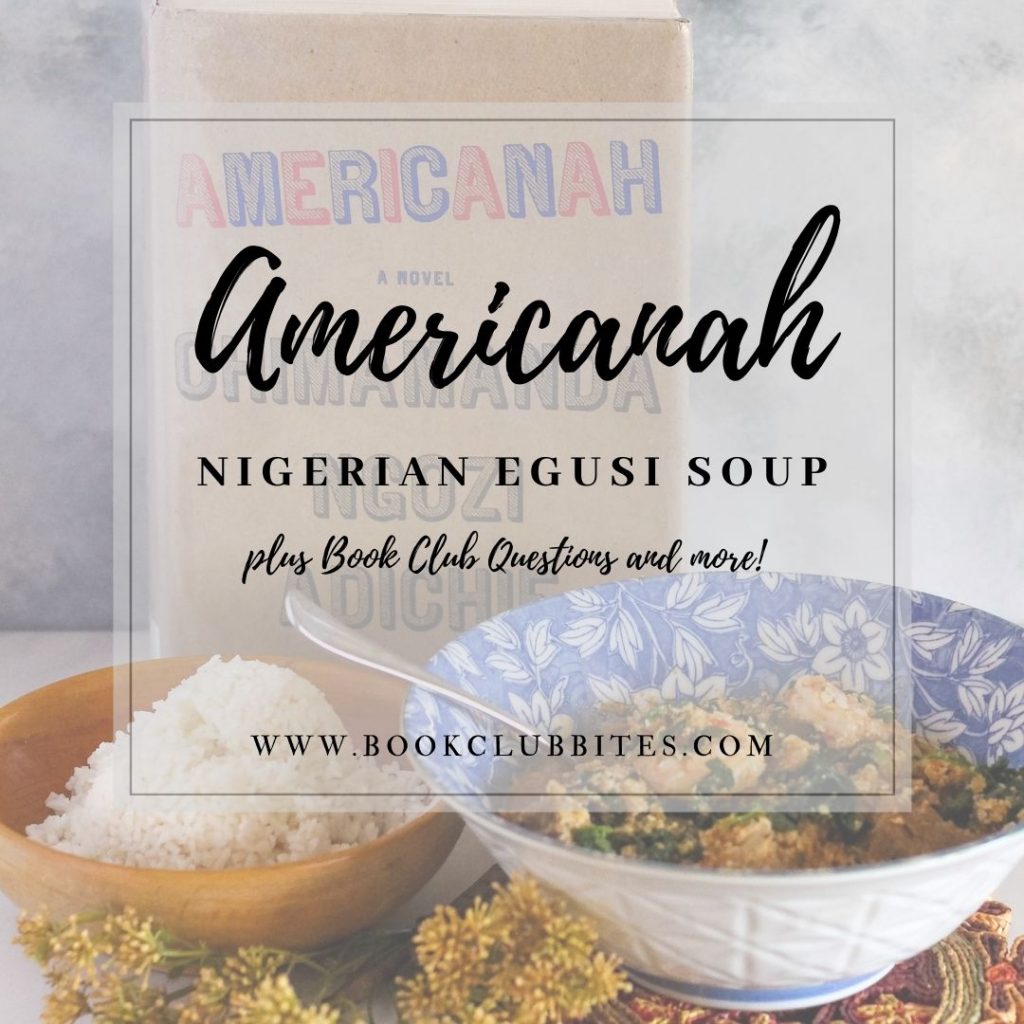
Americanah by Chimamanda Ngozi Adichie is a novel that I’ve seen here and there over the last few years (it was published in 2013), but never felt any draw to read. It was one of those novels that I presumed I knew about by the cover and title, so I passed on it because by those two things alone I was sure I wouldn’t really like it. Anyone else do that? Only me?
I quickly prejudged that this was our era’s Things Fall Apart, but Americanah, while also written by a Nigerian author, is not the same at all. It wasn’t until I saw another bookstagram account asking for opinions on the book and the dozens of replies from readers saying they loved it, that I decided to read it.


It’s not to say that I didn’t appreciate Things Fall Apart by Chinua Achebe, or other similar books, but I’ve struggled lately to read heavy, literary works and, at 600 pages long, Americanah is no easy feat for many readers.
If the length and depth deter you, let me encourage to try the audiobook. Often when I’m struggling to get into or through a book, the audio version is a life saver. That said, Americanah is just old enough now that most book clubs will easily find it at the local library.
Despite its length, Americanah will spark a lively conversation at your book club about both immigration issues in America and England and racial issues in America. The main character, a Nigerian immigrant to America, runs a blog about racism, albeit anonymously, and through her sometimes humorous posts she dissects racism from every angle.
Even though you will likely spend a large chunk of time discussing these two issues, which Adichie brilliantly sheds light on in new and unexpected ways, the story is primarily a star-crossed lovers and self-discovery tale. The characters are multi-faceted, making decisions that frustrate the reader but read true-to-life.
Americanah would be a good read for any book club that would like to discuss the current cultural movements, but have already read books like The Hate U Give or any of the Black Lives Matter non-fiction titles. It’s a great way view the situation from a different angle because the novel looks in on the situation from the eyes of black immigrants from Africa rather than African-Americans, easing the tension slightly, but exposing so much.
You can trust me or the other thousands of 4-5 star reviews on Amazon. In any event, there is plenty to discuss about Americanah and who doesn’t love a star-crossed lovers tale? On that note, I’ve provided book club questions and a delicious recipe for Americanah, so if you are looking for food ideas and more, keep reading!
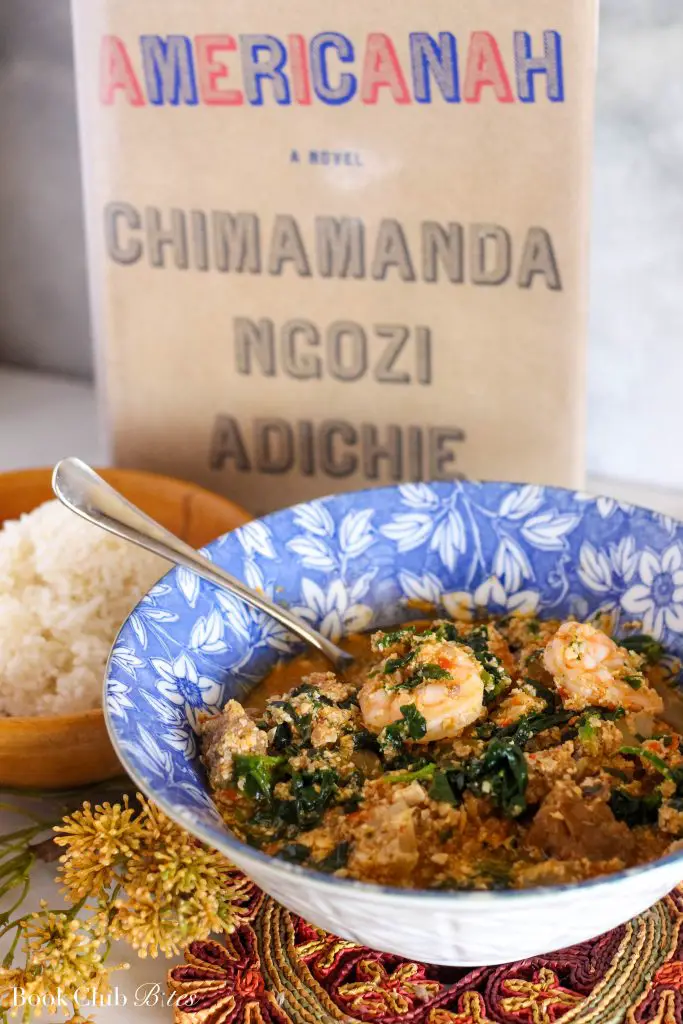
Here’s a brief summary of Americanah:
When Ifemelu is offered the chance to leave military-ruled Nigeria to study in America, she takes the opportunity she never believed she’d have. It means leaving behind her love, Obinze, but he promises to join her. In America, Ifemelu grapples with the realization that her skin color now defines her, something that never occurred in Nigeria, and struggles to find work as an immigrant. When she makes a mistake trying to survive in her brutal new environment, it will drive a wedge between her and Obinze, who never makes it to post 9-11 America, that will take them fifteen years to recover from. Through the journey Ifemelu and Obinze examine the ideas of race, immigration, and home defining them for themselves and finally finding their ways back to each other.

For the Americanah recipe:
The food mentioned in Americanah is rich and varied. From Nigerian to American to British foods, the characters often talk about food. Below are just a few of the instances throughout the book that I noted:
- Chapter 5 – Ifemelu meets Obinzes mother and they eat garri and soup and coke/on the weekends his mother bakes pie with mango slices on top and small brown cakes with raisins
- Chapter 6 – Aunty Uju and Ifemelu fight after the General cancels his visit and egusi soup is spilled on the floor
- Chapter 27- a mocha and blueberry scone for obinze’s day reading at the bookstore Chapter 29 – dinner party at Georgina and Emenike roast lamb, cheese plate, red wine
- Chapter 34- coconut rice with spices (ginger and yellow curry) and cheap merlot from her first overnight visit from Blaine ALSO their reconciliatory meal after their fight in Chapter 39
- Chapter 41-Prosecco, tea, and Blaines virgin cocktails (pomegranate, sparkling water and a bit of cranberry first mentioned when Ifemelu meets Shan) watching Obama win the election
- Chapter 44 – malt and orange juice, chicken stew and rice from Ranyinudo when Ifemelu returns to Nigeria
- Chapter 48- realizing she’s one of the “they have the kinds of things we can eat” people with the Nigerpolitan Club becuase of her longing for fresh salad and steamed vegetables, Blaines quinoa with feta and tomatoes even though she loves killing rice cooked with a lot of oil, fried plantains, boiled yams
- Chapter 51 – mango-orange juice from Jazzhole when she reunites with Obinze for the first time
- Jollof rice is mentioned throughout the book and has been featured on other book review blogs. Check out a recipe here.
- Pepper soup is also mentioned several times and a recipe can be found here.
I usually feature a recipe that holds significance to the main character’s story and I wanted to feature a food from a significant event between Ifemelu and Obinze, but struggled to find a good one. I considered the mango-orange juice, but there are several premade versions on the market.
Instead, I decided to make Egusi soup. Egusi soup is mentioned when Aunty Uju realizes that the General is not coming to spend his holiday with her and instead chooses to spend it with his wife. Watching this occur was a turning point for Ifemelu where I think she settled in her mind to never become like Uju in that sense.
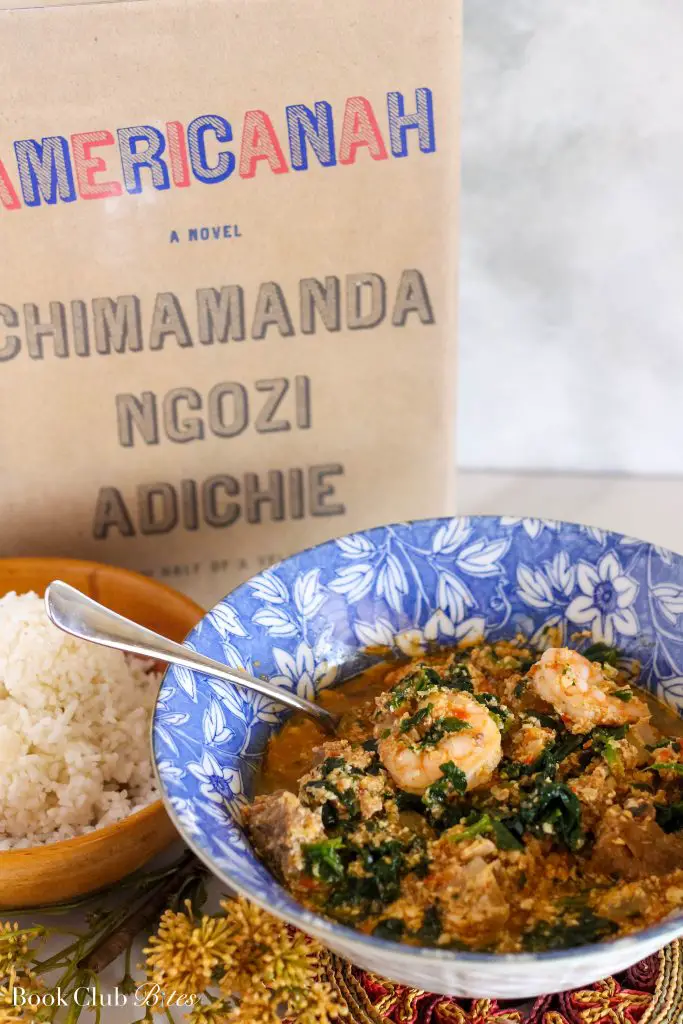
Egusi soup is a very authentic and popular Nigerian soup. The name of the soup comes from the egusi seeds that are ground into a puree and used in the soup. I was able to find egusi seeds easily at the African market in my town, but if you don’t have one, you can try to substitute the egusi seeds with pumpkin seeds or sunflower seeds. Egusi are a type of squash and gourd seeds that have been dried.
I will say that this soup has a very pungent smell because of the egusi seeds. However it tastes nothing like it smells and is quite good. It is similar to Epoisse de Bourgogne (the stinkiest cheese in France) which smells so strong it’s been banned in some places but tastes wonderful. In any case, Egusi Soup is authentic and will have your book club talking. It’s definitely as complex as the novel Americanah!
If you are using egusi seeds for the soup, be sure to wash them well, rinsing several times with water. I watched about twenty youtube videos by Nigerian cooks to formulate my recipe and all of them mentioned this step. They also said that whole egusi seeds which you can grind yourself are preferable to pre-ground egusi because of the ability to wash them and make sure they are clean.
You may also choose to include the habanero or leave it out depending on your spice level preference. It won’t make or break the soup!
Eating this soup and discussing the novel Americanah will definitely create a unique experience for your book club that they will remember! So, if you are looking for food suggestions for Americanah, I think your book club will be happy to try Egusi Soup!
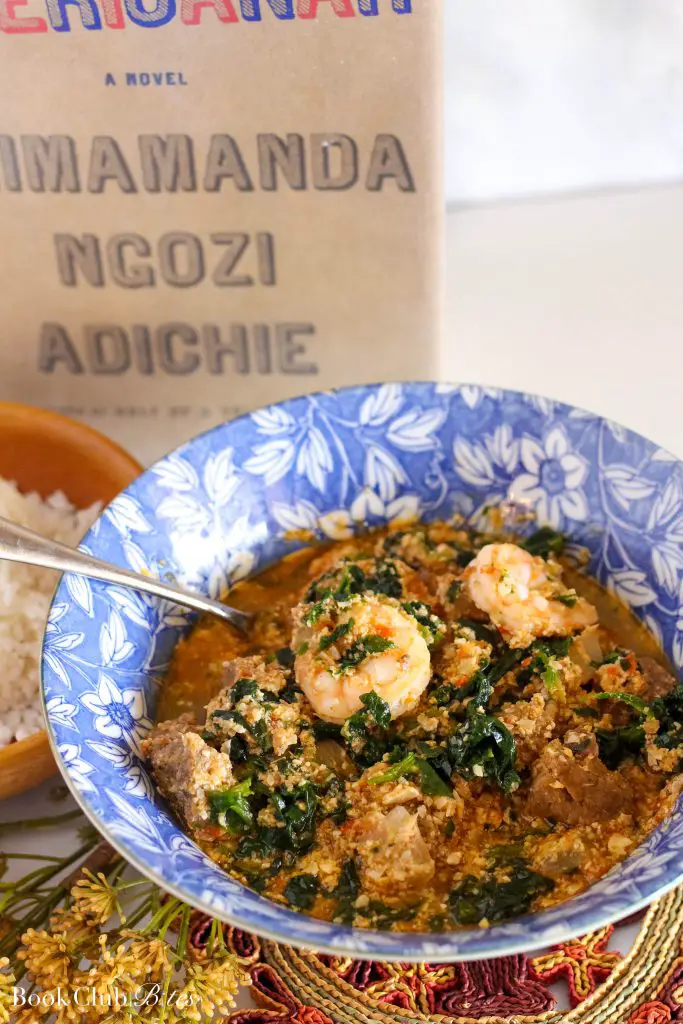

Americanah Egusi Soup
Ingredients
- 1 lb beef stew meat
- ¼ tsp salt
- ¼ tsp pepper
- ½ tsp smoked paprika
- 1/3 cup oil
- 1 red bell pepper seeded and chopped
- 1 habanero pepper seeded and chopped (optional)
- 2 medium onions chopped and divided
- 1 cup egusi seeds
- 1 clove garlic chopped
- 2 beef boullion cubes
- ½ – 1 lb shrimp
- 2-3 cups chopped spinach
- Salt and pepper to taste
Instructions
- Season the beef with the salt, pepper, and smoked paprika. In a heavy bottom soup pot, place the seasoned beef and cover with 3-4 cups of water.
- Cover the pot and simmer on low for two hours or until the beef is fork tender.
- Once done, separate the beef from the stock and set both aside in bowls.
- Finish preparing for the soup by blending the red bell pepper, habanero pepper (optional), one of the chopped onions, and a cup of water in a blender until pureed. Set aside in a bowl.
- Clean the egusi seeds well, rinsing several times with water to get rid of any dirt or germs on the seeds.
- After cleaning the blender of the pepper mix, place the cleaned egusi seeds and 1 cup of water in the blender and puree. Set this aside as well.
- Using the same soup pot, or a similar pot, heat the oil on medium heat until it’s hot.
- Add the second chopped onion and allow to cook in the oil for 3 minutes until beginning to turn translucent.
- Next, add the cooked beef and sear for 2 minutes in the oil with the onion.
- Add the garlic and cook until fragrant, about 1 minute.
- Pour the pepper mixture into the pot, cover, and allow it to simmer for 10-15 minutes. Stir occasionally.
- Add the reserved beef stock and the two beef Boullion cubes to the pot and allow the mixture to come once again to a simmer, about 3-5 minutes.
- Once hot, slowly add the egusi puree by the spoonful to the pot and allow the mixture to cook for 10 minutes, covered.
- Stir the soup lightly and add the spinach and shrimp, cooking just until the shrimp is done, about 6-7 minutes. Season to taste with salt and pepper.
Notes
Americanah Book Club Questions:
*WARNING: May contain spoilers!
- Ifemelu has strong opinions. She runs a popular blog in America about race and explores racism from every angle, often cutting arguments to the quick. However, she does so anonymously. In addition, she often criticizes Curt, Blaine, and Obinze for their weaknesses, but fails to take responsibility for her part in the relationships struggles. How did this make you feel about Ifemelu? Why do you think she chose anonymity for the blog?
- Why do you think Ifemelu sabotages her relationship with both Curt and Blaine? What are some reasons that you think she does this outside of her lingering love for Obinze?
- On her blog, Ifemelu states that the end of racism in America will only come through romantic love between the races, yet even she struggles to get past these hurdles with Curt and even Blaine (who she eventually finds too different from herself). Do you agree that romantic love can change racism in America (or elsewhere)? What do you think could aid in the end of racism? Is it possible to end racism?
- Ifemelu is a native African who immigrates to America. Discuss the ways her experience with racism differed from an African-American facing the same prejudices. Were you able to view racism in America in a different light by reading through the lens of immigration? How did it challenge you?
- Immigration is a hot topic in America and England and has been for a long time. Many people feel strongly one way or another and some people choose to ignore the issue altogether. How did this book challenge your personal views on immigration? Discuss the similarities and differences in Ifemelu’s immigration experience to America and Obinze’s immigration experience to England.
- In the end, both Ifemelu and Obinze return to Lagos, one by choice and the other by force. Do you think that Ifemelu, Obinze, or any of their friends benefitted from the experience of immigration? Why or why not? How would their lives be different if they hadn’t left Nigeria?
- Ifemelu passes a lot of judgement on her friends in Nigeria and their unhappiness when she returns, even though she is very unhappy herself. Why don’t you think she recognizes this dichotomy? Or do you think she does?
- Discuss Obinze’s decision at the end of the book. Do you think it was fair of Ifemelu to demand it of him? Do you feel justice for Ifemelu’s Aunty Uju in Obinze’s choice? Can personal happiness exist if someone destroys other lives in pursuit of it?
- The book’s title, Americanah refers to a native Nigerian who returns from America changed by the experience. Do you think Ifemelu has become an Americanah? What would she say?
- Discuss other books you have read about immigration and racism. How does this book compare?
Have you read Americanah? What did you think? How did it speak to you on the issues of racism and immigration? What are some similar books you’ve read?
Until next time, Happy Reading!
Disclosure: This page contains affiliate links. In the event of a sale, I will be awarded a small commission (at no extra cost to you or the featured book’s author). All opinions are 100% mine and every book, unless otherwise noted, is handpicked by me to be featured on the site.
Other Black Lives Matter Books that you might enjoy if you liked Americanah!




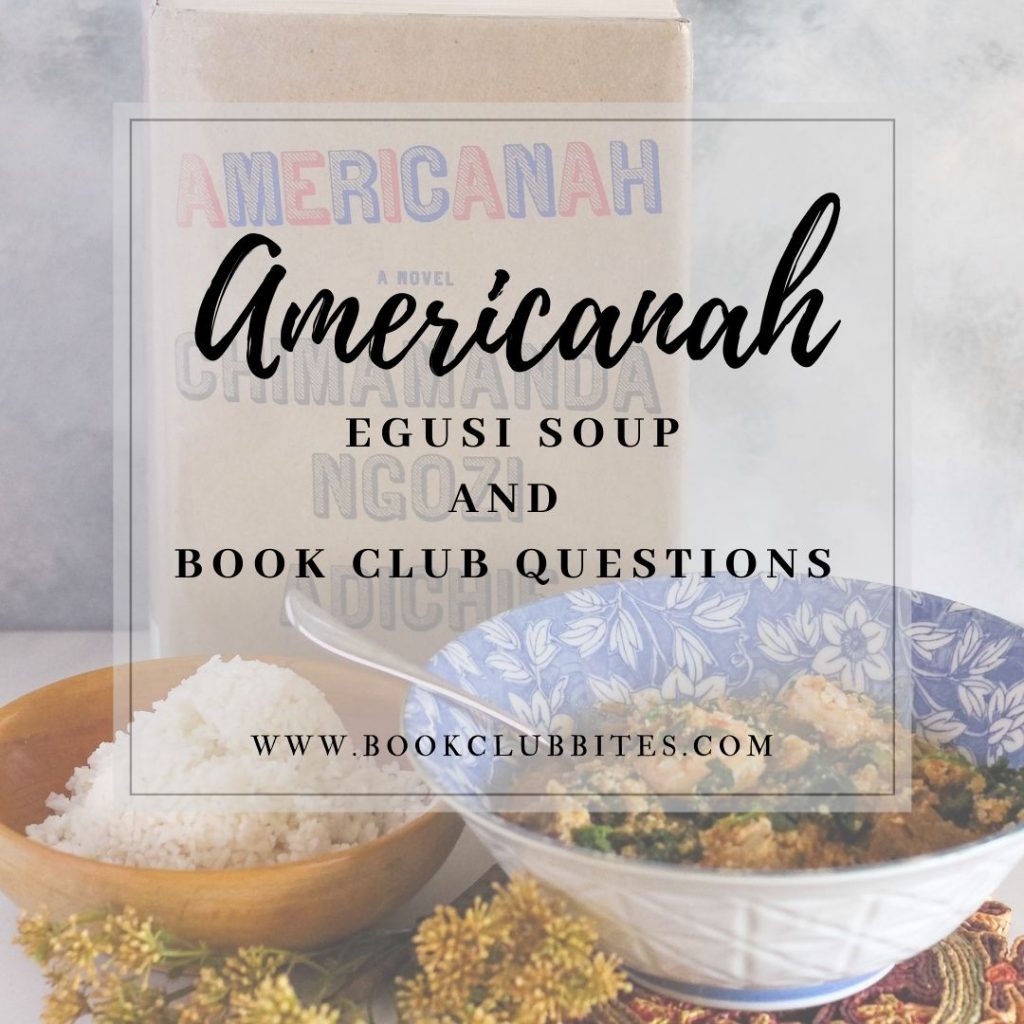
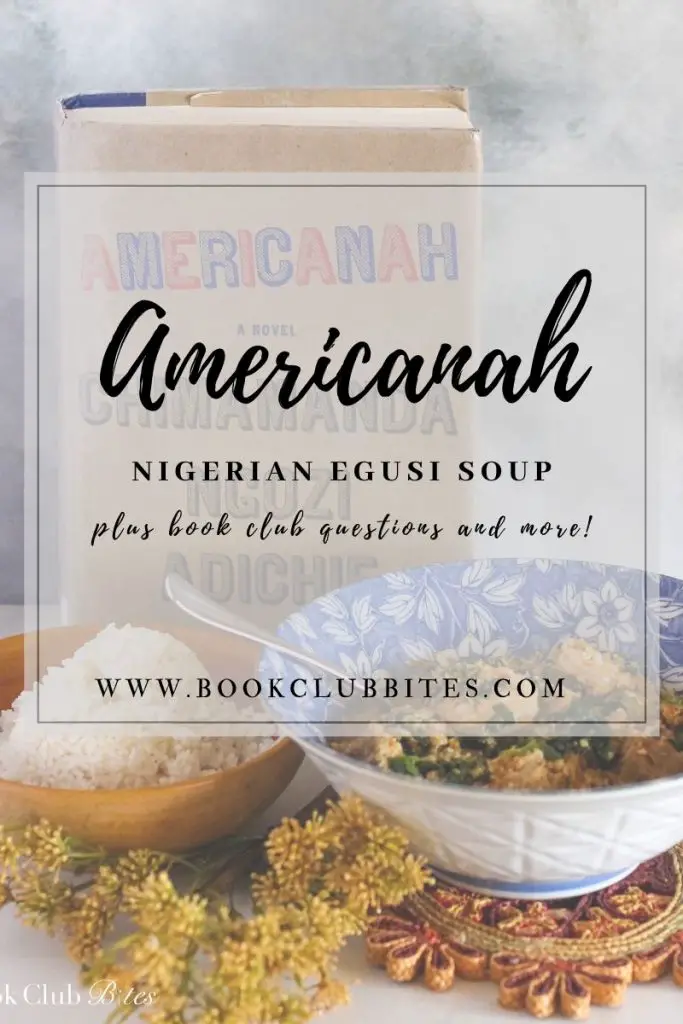

Pingback: 10 Black Lives Matter Novels Your Book Club Should Read - Book Club Bites